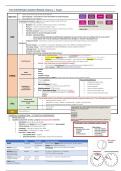THE DISTRESSED OLDER PERSON History + Exam
• Check where duress alarms and closest exits are
Approach • Open language – one question at a time and simple non-jargon language
• Have patient and carer together
Presentation from where? ® (1) home, (2) surgical/medical wards, (3) MH unit,
(4) outpatient or community health centre
• Biological: sleep, appetite, weight change, energy, concentration
• Mood: low/ anxious/ elevated/ irritable/ angry
• Thoughts: worries regarding health/finances, guilt, worthlessness, the future
• Psychotic symptoms: delusions and hallucinations
• Suicidal ideation or recurrent thoughts of death
• Delusions and hallucinations
HPC o do you ever get the feeling that something odd is happening or do you ever hear voices or see things when no one is around?
o Do you believe others may be watching or interfering with your thoughts or someone is stealing from you
• Change in function : not going out/ reduced usual activities, reduced contact with family & friends, reduced self care
Cognitive Hx
• Memory changes – e.g. repetitive in conversation, forgetting words, events, difficulty navigating familiar p[ace
• Personality change? = APATHY, DISINHIBITION, FOOD PREFERENCE, SOCIAL CONDUCT, EMPATHY
• Language issue? – speaking and understanding
• Recognition of people / things
• Problems with planning, organising and problem solving
1. Time-course (Temporal nature) = When were you 1st concerned about your diagnosis?
a. Acute vs gradual onset AND stable vs progressive (has anything changed since 1st or index attack)
b. Episodic (how are they between episodes? – panic attacks, calm) vs Persistent (? fluctuations)
Past Psych Hx c. When did you look up about your condition online? How did you feel?
2. Severity = How many times were you admitted to hospital?
a. What were the main diagnoses that you understand you have diagnosed with?
b. How managed? – MEDS, SPECIALISTS? IMPACT ON ADLS?
• Mobility
• Vision
PMHX
• Hearing
(Patient factors)
PMHx • Cognitive change
• Comorbid medical conditions – HTN, T2DM, CKD, Cirrhosis, chronic infection, COPD
• Check compliance Drug seeking behaviours
• Blister packs • Selling prescription drugs
• Past consultations (GP, psych) • Forging prescriptions
Medications / o Frequency, outcome, therapy (CBT, ECT) • Doctor shopping
Treatments • Lifestyle measures (?effectiveness) • Recurrent dose escalation
(past/present) • Meds = Name, type and dose ( BZD, Anti-psych, Anti-depr) • Recurrent prescription loss
o Do you take it everyday? (anti-dep), taken PRN (BZD)
• Abuse of alcohol and other drugs
o Caffeine,
o alcohol
“Do you think anyone in your family has a psychiatric disorder or behaves similar to you?” (usu. OCD patients are right)
Family Hx of
• Intergenerational trauma – ATSI
Mental or psychiatric
• Depression + anxiety + Bipolar + schizophrenia + suicide + mood disorders
FHx illness
• Recent sig. emotional event where family member is unwell
• Chronic pain
FHx
• Dementia
See psychiatry hx
SHx
GENERAL EXAMINATION - COGNITIVE ASSESSMENT
1. Mental state exam
2. Cognitive assessment (3 tools) ® help to track fluctuations over time
a. Orientation to time, place and people
b. Attention (spell WORLD backwards, count backwards or days of week)
c. 3-item memory recall (apple, table, coin)
d. Language – naming e.g. watch, pen, table
e. Frontal lobe – Luria test (fist ® edge ® palm)
f. Clock test – helps check
i. Visuospatial skills – neglect
ii. Executive function – perseveration, stimulus bound response
TIME Threshold Clinical significance Left sided
MMSE 7-10mins <24/30 (mod) Easy to use BUT biased against poor education, visually impaired
< 17 (severe) Cannot detect subtle memory loss
MOCA (Montreal 10-15mins <25/30 Good for MCI - Better for frontal deficits than MMSE
cognitive assessment)
RUDAS (Rowland 10mins <26/30 For those w/ English NOT as 1st language
universal dementia > BUT less reliable on language
assessment scale))
ACE-III (Addenbrooke 15-20 mins <82/100 Only pictures - avoids any language barriers
cognitive exam)) (5 mins) <25/30
FAB (frontal FTT or impulse disorders for frontal lobe deficits
assessment battery)
, COGNITIVE ASSESSMENTS
• Remember to have your own bedside tests ready - one or two for each domain
o Execute – frontal lobe
o Visuospatial – parieto-occipital lobe
o Memory - temporal lobe
o Attention - frontal lobe
• Learn common profiles of deficits in different disorders
• Consider the correlation between cognitive tests and neuroanatomy
• E.g. Previous stroke + low MOCA ® vascular dementia, vascular depression?
There’s a pattern in this puzzle of
letters and numbers. Please draw
lines to complete the pattern




